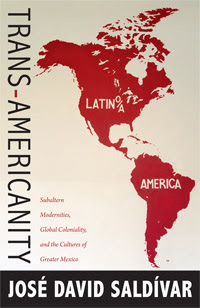José Saldívar's Trans-Americanity
What is Trans-Americanity? Is it a political ideal that can help us to move beyond the nationalisms and regionalisms that harm the well-being of many people in the Americas? Can Trans-Americanity, for example, provide an ideal capable of moving our society past current nationalist, nativist movements that, from a position of power, are harming immigrants in the United States by intimidation, mass raids, and unjust deportation?
In his book Trans-Americanity: Subaltern Modernities, Global Coloniality, and the Cultures of Greater Mexico (Duke University Press, 2012), José David Saldívar describes Trans-Americanity, at least in part, as an utopian vision for the Americas--Anglo and Latin; North, Central, and South.
For Saldívar, Latin America and the United States share the crucible of "coloniality, ethnicity, racism, and the reification of scientific progress" that emerged in Modernity with the European colonization of the Americas and the slave trade (p. xv). Latin America and the US form an enmeshed unit, Americanity, that is part of a single world order. Their relation includes "a continuing massive migratory flux" from the Americas' south to the north (p. xv).
The anti-immigrant reaction of nationalists and nativists against this flux, even in academia, often involves bigotry and US chauvinism. Against this, Saldívar sides with the "utopian integration of the Americas (p. xv).
If my interpretation holds, for Saldívar Trans-Americanity is, in part, an utopian political ideal. Specifically, Trans-Americanity seeks to integrate "North America's 'utopia' of social equality and liberty'" and "Latin America's indigenous 'utopia of reciprocity, solidarity, and direct democracy'" (p. xv-xvi).
This ideal, then, integrates values from Anglo- and Latin-, North-, Central-, and South-America into an unified political vision.
Adopting it requires, at the very least, giving up notions of cultural, philosophical, ethnic, or racial superiority by any single group. White supremacy, demands for assimilation to Anglo-Saxon culture, and US American exceptionalism, for example, cannot be part of this Trans-American ideal.
A task for Trans-American intellectuals, perhaps, would be to imagine, describe, experiment with, and analyze the idea of a Trans-American society that integrates liberty and reciprocity, equality and solidarity, direct and participatory democracy into its guiding vision and aims.
In his book Trans-Americanity: Subaltern Modernities, Global Coloniality, and the Cultures of Greater Mexico (Duke University Press, 2012), José David Saldívar describes Trans-Americanity, at least in part, as an utopian vision for the Americas--Anglo and Latin; North, Central, and South.
For Saldívar, Latin America and the United States share the crucible of "coloniality, ethnicity, racism, and the reification of scientific progress" that emerged in Modernity with the European colonization of the Americas and the slave trade (p. xv). Latin America and the US form an enmeshed unit, Americanity, that is part of a single world order. Their relation includes "a continuing massive migratory flux" from the Americas' south to the north (p. xv).
The anti-immigrant reaction of nationalists and nativists against this flux, even in academia, often involves bigotry and US chauvinism. Against this, Saldívar sides with the "utopian integration of the Americas (p. xv).
If my interpretation holds, for Saldívar Trans-Americanity is, in part, an utopian political ideal. Specifically, Trans-Americanity seeks to integrate "North America's 'utopia' of social equality and liberty'" and "Latin America's indigenous 'utopia of reciprocity, solidarity, and direct democracy'" (p. xv-xvi).
This ideal, then, integrates values from Anglo- and Latin-, North-, Central-, and South-America into an unified political vision.
Adopting it requires, at the very least, giving up notions of cultural, philosophical, ethnic, or racial superiority by any single group. White supremacy, demands for assimilation to Anglo-Saxon culture, and US American exceptionalism, for example, cannot be part of this Trans-American ideal.
A task for Trans-American intellectuals, perhaps, would be to imagine, describe, experiment with, and analyze the idea of a Trans-American society that integrates liberty and reciprocity, equality and solidarity, direct and participatory democracy into its guiding vision and aims.
 |

Comments
Post a Comment